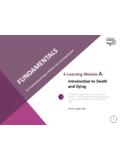Transcription of Ethics and Working with Death, Dying, and …
1 Ethics and Working with death , dying , and bereavement Daniel J. Wachtel, Clinical Psychologist Geropsychologist I share the fear of death with every human being: it is our dark shadow from which we are never severed. Irvin D. Yalom, death and Discomfort Euphemisms for death : Expired Passed Lost Moved on Not to mention the dozens that attempt to make light of death . death and dying Woody Allen on death : I m not afraid of death , I just don t want to be there when it happens. The Good News: Although the discomfort is natural and ingrained in our society, this is a skill. We can learn to do it, and do it well, but it takes the willingness to challenge yourself, face your fears, and anticipate your challenges. Take on this challenge, at least, for the next few hours.
2 Group Exercise Imagine for a moment that you have just been informed that you have 24 hours to live. What would you do? Who would you spend those hours with ? What do you regret? What are some of your thoughts and feelings? death and dying How do you know if you are able to, or not able to, do this type of work? death & dying Questions to consider during this workshop How does the idea of doing this type of work make me feel? What do I do when I experience the death of a loved one while doing this type of work? What are some of my biggest concerns about Working with death , dying , and bereavement ? death & dying Why death , dying , and bereavement ? Three parts to this presentation: 1) Treating clients who are grieving 2) Treating clients who are terminally ill/ dying 3) What to do when a client has died death and dying Part 1: Grief and bereavement : Treating those that are mourning the death of a loved one.
3 Grief bereavement - the experience of losing to death a person to whom one is attached. Grief- refers to the emotional distress associated with the experience of bereavement . Mourning- the social expression of grief or bereavement , and is often influenced by religious beliefs and cultural customs. Grief Grief: Is it a mental disorder? Grief How to differentiate experiences: normal vs. diagnostic, complicated vs. uncomplicated, successful vs. problematic mourning. Diagnostic terms: traumatic grief, complicated grief, pathologic grief, abnormal grief, chronic grief, pathologic mourning. History of Diagnoses DSM-IV-TR: bereavement : When the focus of clinical attention is a reaction to the death of a loved one. DSM-IV-TR referred to this V-code as normal grief.
4 Criteria E for Major Depressive Episode: ..after the loss of a loved one the symptoms persist for longer than 2 (rather than the typical 2 weeks) Major gap in DSM IV-TR The 2 month window only applies to death , and not other major life stressor. So, a person who experienced a divorce, disability, illness, or other life stressor would meet criteria, but person grieving would not. That s like saying that just because the bereaved is more at risk for heart disease, a physician would write off chest pain as bereavement rather than a medical condition requiring further work-up. DSM-5 eliminated the grief exclusion criterion from MDD. Zisook & Shuchter bereavement and grief in the DSM-5. Initial proposals for Complicated Grief were rejected.
5 The grief exclusion criteria for MDD was eliminated. But, a long paragraph, in very small font, was added to MDD. The side note attempts to differentiate MDD from grief with the following: Grief has focus on the deceased vs. all encompassing, does not include self-esteem issues, suicidal thoughts linked to joining the deceased not worthlessness. bereavement and grief in the DSM-5 Only addition in DSM-5 is in section for further research Persistent Complex bereavement -Related Disorder: Criteria includes a list of symptoms that have persisted for min of 12mths. Can add specifier with traumatic bereavement (homicide or suicide) Differential DX: normal grief, depressive d/o, PTSD, and separation anx d/o. bereavement and grief in the DSM-5 Differentiating Persistent Complex bereavement Disorder with PTSD Can dx both Intrusive thoughts in PTSD focus on event, bereavement focus on relationship with deceased A focus on the manner of death and what happened.
6 A preoccupation with the loss and yearning for the deceased, which is absent in PTSD Grief- Prevalence 80%-90% of bereaved individuals experience normal or uncomplicated grief. How to Conceptualize bereavement : It can be seen as a risk factor for the development of mental disorders. We can expect to see an increase in symptoms (depression, anxiety, cognitive deficits, etc.) but not the development of a disorder. Servaty-Seib, Zhang, et al. 2006 Clinical Scenario: You are Working in the geriatric department in a hospital and the program director approaches you and says, we need to offer bereavement services to our patients. You are asked the following: How do we determine who needs grief counseling? What questions would you ask a patient who recently experienced the loss of a loved one to assess how they are coping with that loss?
7 Grief How long should one grieve? Grief, which can last weeks, months, or years, is a normal phenomenon that is healthy and adaptive. It s not about the time/duration, it s about the severity and the impact in one s life. Zisook, S. & Shuchter, Grief Why talk about different types of grief in an Ethics workshop? Well, the question is: do we treat, or recommend treatment for, something that may be normal, healthy, and adaptive? Ethics Code (APA) Do No Harm Risk of Treating: The majority of bereaved people have no pathological indicators and do not usually require the help of professional counselors or therapists . Grief counseling is at best weakly effective and at worst harmful. Larson Bonanno & Lilienfield Gamino et. Al.
8 Grief There is just as much empirical evidence that treatment works (Haley et. Al.) Risks of not treating: Complicated grief Disorder symptoms have been associated with : Increased risk of cancer Hypertension Cardiac event Suicidal ideation Functional impairment (social, family, work) Increase alcohol and cigarette consumption Increased rate of hospitalization Reduced quality of life Zhang, et al. Grief How to Assess true need: Does the client meet diagnostic criteria. (see handout) Look for functional impairment such as impairment in activities of daily living (ADL) Two Screening Questions: 1) Are you having trouble dealing with the death ? 2) Are you interested in seeing a grief counselor to help with that? Gamino et. Al. Grief Assessment instruments: The Hogan Grief Reaction Checklist (HGRC) The Impact of Event Scale-Revised (IES-R) The Texas Revised Inventory of Grief (TRIG) The Traumatic Grief Evaluation of Response to Loss The Inventory of Complicated Grief (ICG) Grief So, now we have some skills, some knowledge, but all the information in the world is not going to matter if we can t get it across.
9 bereavement counseling impacts the clinician in at least three ways: 1) Awareness of losses 2) Feared losses 3) Existential anxiety Dunphey & Schniering Grief Counselors who treat clients experiencing grief also experience intense emotional and mental states. How can we tread the thin line between empathy and over-identification with the client s loss? Dunphy & Schniering How to keep our balance: Remember our role: We help facilitate our client s grief. 1) Know our own grieving process 2) Appropriate use of self We help them with readiness for change: What in your grief expression is limiting your life? Smith Grief How do we make the shift from viewing a personal loss experience as an interfering factor, to seeing it as a critical resource in our work with the patient?
10 Dunphy &Schniering Happiness after loss? What was now making her happy, she told me, was that finally, at the age of eighty in a retirement home, she had a room of her her furniture go was a great loss, but also a relief. Leaving them felt like shedding a cocoon; freed from the ghosts of debris of the past, she had a new room, a new skin, a new start. A new life at the age of eighty. Yalom How we can help: ..a potential awakening experience lies in almost every course of grief. Awakening consciousness can often be facilitated by the help therapist with a greater sensibility to these issues. Human connectedness: it is the synergy between ideas and intimate connection with other people that is most effective both in diminishing death anxiety and in harnessing the awakening experience to effect personal change.




